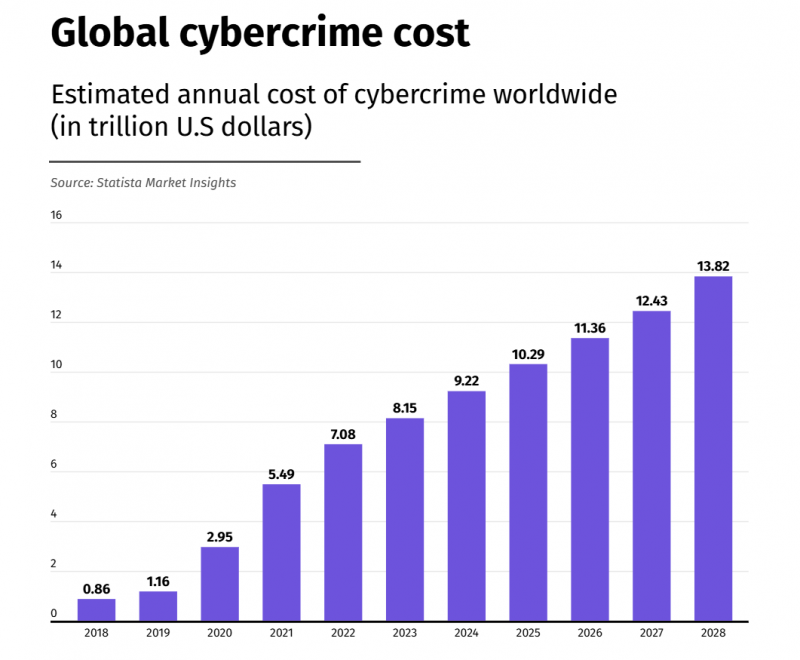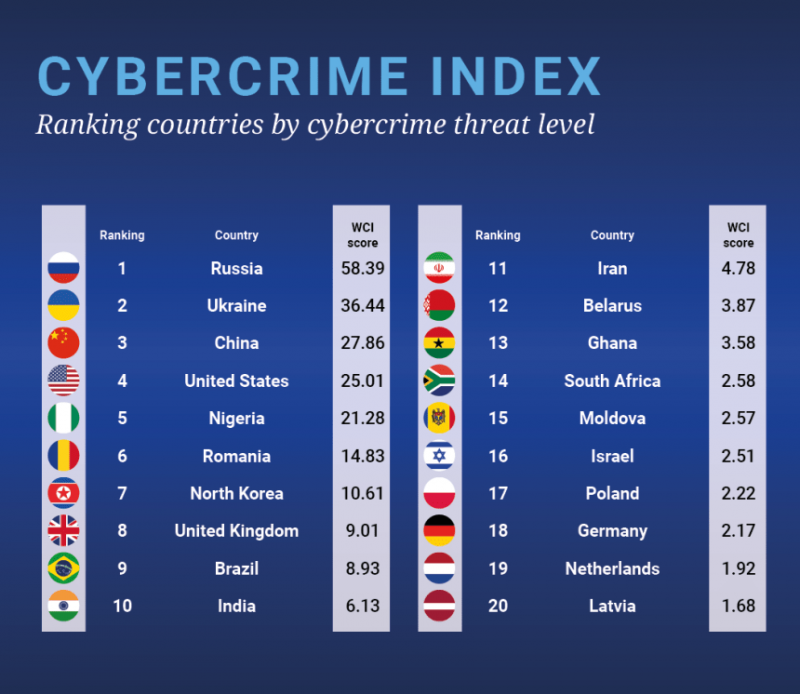Scams without borders: 8 countries fueling global fraud
Interesting
−
21 April 2025 16723 5 minutes
As the world advances, fraudsters are devising increasingly creative ways to deceive people. Ironically, fraud has become more brazen and sophisticated than ever before. According to data from Stocklytics.com, the annual cost of cybercrime in 2024 is projected to reach $9.2 trillion—an increase of $1 trillion from the previous year. This figure is expected to rise by another 70 percent by 2028, reaching a staggering $13.8 trillion.

Russia
Russia tops the list as the number one country for cybercrime. According to the World Cybercrime Index (WCI), Russia ranks first with a score of 58.39. Hacking, online fraud, and other cybercrimes are frequently traced back to individuals operating within the country.

Studies indicate that 74 percent of revenue generated through digital crimes originates from Russia. The country is notorious for credit card fraud and hacking, where criminals often use malware or phishing techniques (fake websites or deceptive emails) to steal credit card information.
But it doesn't stop there—stolen card data is sold on the “dark web,” a hidden section of the internet not indexed by standard search engines. This illicit trade, known as “carding,” allows the highest bidder to purchase the data and commit financial fraud using the victim’s information.
Ukraine
Cybercrime in Ukraine, which ranks second in the index, has risen significantly in recent years. Common forms of cyber incidents include malware distribution, phishing attacks, and unauthorized access to systems or accounts. Ukraine’s Cyber Risk Index (CRI) score is 36.44.
The State Special Communications Service (CYeRT-UA) reports that during wartime, attempted breaches of government information systems have escalated. In 2024 alone, CERT-UA handled 4,315 cyber incidents—an increase of 69.8% from 2,541 cases in 2023.

Most attacks target local government bodies, national institutions, security and defense sectors, energy infrastructure, commercial organizations, and telecom networks. Ukraine claims that Russia is behind many of these cyberattacks. Conversely, Russia’s Ministry of Internal Affairs claims that more than 90% of cybercrimes in Russia originate from Ukraine. The two nations, already accusing each other of war crimes, are now locked in a digital blame game over cybercrimes as well.
China
China is widely recognized as a global hub for counterfeit goods. The country has become synonymous with producing near-perfect replicas of original products—and now, it’s reportedly producing counterfeit gold. Chinese consumers are being tricked into buying fake gold stamped with the “999” purity mark.

Online fraud in China is also growing rapidly. Over 800,000 individuals in Europe and the United States have had their personal data compromised through scams run by fake luxury brand websites based in China.
While crimes such as corporate fraud and intellectual property theft are strictly punished in China, government corruption remains widespread. China ranks third in global cybercrime risk, with a Cybercrime Perception Index (CPI) score of 27.86.
United States
In recent years, the United States has become one of the most fraud-prone and victimized countries. American scammers frequently use phishing techniques and lottery scams. They often pose as bank representatives to trick victims into giving up passwords and financial details.

Lottery scams operate similarly: scammers pretend the victim has won a prize and request bank information to “process” the winnings. Online scams involving fake job listings or investment opportunities are also rampant. According to statistics, fraudsters in the U.S. have scammed $4.6 billion from fellow Americans through phishing, lottery schemes, and other digital crimes. The U.S. ranks fourth on the Global Network Index (GNI).
Nigeria
Nigeria is next on the list of countries notorious for fraud. A well-known scheme called the “419 scam” involves fraudsters posing as wealthy individuals who request financial assistance in exchange for a large reward. They often forge documents to appear legitimate.

In addition, Nigerian scammers use fake profiles on dating sites and social media to build online relationships. Once trust is established, they invent personal crises—such as medical emergencies or work issues—to solicit money. Nigeria ranks fifth on the CPI with a score of 21.28.
Romania
The most common scam in Romania is auction or trade fraud. Criminals post fake listings for valuable items using pictures and details copied from legitimate websites.
When someone places the highest bid, they’re asked to send payment—but the item never arrives, and the buyer loses their money. While exact figures are unavailable, Romanian scammers are considered global leaders in online auction fraud.

Romania also faces growing issues with money laundering, identity theft, business email fraud, and other types of online deception. The country ranks sixth in global cybercrime with a score of 14.83 on the JKI rating.
India
India, one of the world’s most cybercrime-afflicted countries, is especially known for online fraud and tech support scams. Criminals use scare tactics—such as pop-up ads, emails, or phone calls—to convince victims their devices are infected or at risk of data loss. They then offer urgent “technical help.”

The scam often ends with the victim’s confidential information being stolen and used for extortion or illegal payments. In 2024, digital financial fraud in India has quadrupled, placing the country 10th on the JKI. With over 806 million internet users—the second-highest in the world—India-based call centers have stolen more than $10 billion from Americans alone.
Pakistan
Pakistan has reportedly lost $400 million due to bank loan fraud schemes. The country is quickly becoming one of the top nations associated with fraud.

Fraudsters in Pakistan often lure people with false promises of “easy loans” to gain access to their bank account information, making them targets of phishing attacks. SIM card-related crimes are also rampant, with many people unaware of how many phone numbers are registered in their names.
The growing number of searches on Google for “most fraudulent countries” in 2025 reflects rising global concern about cybercrime. As technology continues to evolve, so do the tactics used by fraudsters around the world.
Live
All




